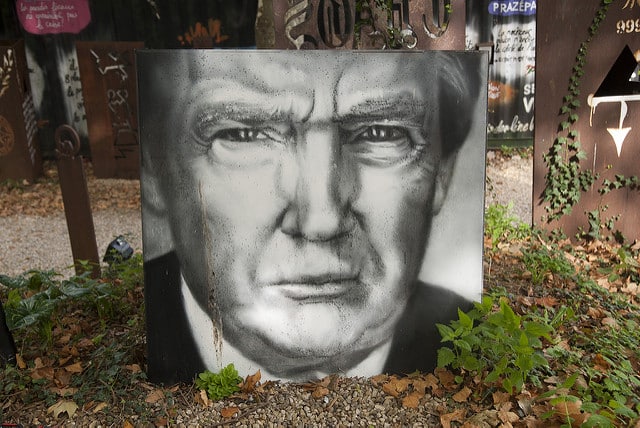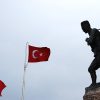
The election of Donald Trump as US President, hard on the heels of the Brexit referendum –and both results took European leaders by surprise– has forced Europe to confront another mirror. Both reflections show an EU that is divided, but in need of unity and initiative. The EU needs a response to what Trump may entail, and what the Union itself and its members require. What is not at all clear is that it is in a position to be able to react. It remains to be seen whether, rather than acting as a vaccine and a new spur to Europe, Trump’s arrival at the White House –a sort of “American-style Brexit”, only this time geared towards the impossible “globalisation in a single country”, as it has been called– may instead infect anti-European parties, movements and voters in the EU.
The idea, in principle laudable and highly necessary, that the Union should receive a new spur did not make itself evident in September at the 27-member (without the UK) summit in Bratislava and little will have changed for the next, in December with all 28 in attendance. We will need to wait until 2018, at the earliest, having got through what could be a difficult 2017, with elections in France, Germany and the Netherlands. Nor should we forget the referendum on 4 December on political reform, a theoretically internal issue, in which Matteo Renzi is staking his future, that of Italy and also in part that of Europe. In other words, in the redefinition of transatlantic relations, of Europe itself and the global agenda, time is on Trump’s side, not on Europe’s, because by the end of 2017 his Administration will have a fully settled agenda.
Transatlantic relations, and the very concept of the West, will change with a Trump Administration, the make-up of which remains as yet unknown, except that its leader has promised to invert the internationalist (although not the multilateralist) vision of his predecessors in the job. However, Obama had already asked both his partners and international organisations to play a greater global role, while allegedly stating that the US should, in an expression that upset the State Department, ‘lead from behind’.
A certain de-globalisation and de-westernisation of the world is taking place; TTIP, the Transatlantic Trade and Investment Partnership, which not only Trump rejects but also an increasing number of Europeans, is foundering and will have to be reinvented in a more modest form. Europe should defend the Paris Agreement on climate change, opposed by Trump, and in this it has the support of China. Moreover, with Trump in the White House, greater anti-Americanism may resurface among some Europeans, a sentiment Barack Obama had defused. It may be that US relations with Russia will improve under the 45th president, and all parties become more committed to the fight against the Islamic State, although Trump may hamper crucial relations with China, and thereby destabilise the world economy even more.
Some may think that Trump’s preference for forcing the Europeans to pay more for their defence will help Europe to make headway in this area in December, driven on by Germany, France, Italy and Spain. The German Defence Minister, Ursula von der Leyen, and the EU’s High Representative for Foreign Affairs and security policy, Federica Mogherini, are of the opinion that this provides an opportunity to make decisive steps towards a defence union (not a ‘European army’). For the former, after Trump’s victory, Europe and Germany will have to be ‘more self-sufficient in security matters’.
If Trump carries out his warning and scorns the value of NATO, the direction of the Atlantic alliance (the largest and most enduring of modern times, and the source of a major lever of power for the US) will change. But as things stand, NATO continues being the key to the European security firmament, although with Trump there will be more question marks about the credibility of the American ‘umbrella’. It is possible that the European Council meeting in December will make some modest progress in this area, but home-grown European defence, despite having ample popular support in the opinion polls, is not viewed as a top priority by voters; they want the EU to contribute to solving their more immediate problems and worries, ranging from the fight against Jihadist terrorism to controlling immigration and restoring the fortunes of the middle and working classes, who feel they have lost out, abandoned and with their identities undermined (the same people who provided the bedrock of Trump’s victory). It is also necessary to complete the Economic and Monetary Union and fight, as is already happening, against tax avoidance by large corporations, especially digital ones.
In Europe, as in the US, voters are in a highly rebellious, volatile mood. Pro-European sentiment has cooled several degrees, and Euroscepticism has grown. Even with Trump in Washington, it is by no means certain that European citizens will be in any mood for what is tritely referred to as ‘more Europe’: rather the opposite, due to a certain reversion to all that is national, as far as identity is concerned, which also counts. Euroscepticism –with the notable exception of the Spanish– and pessimism about Europe has spread throughout the EU, as shown by the recent Demos poll, in which the Elcano Royal Institute participated, part of a research project entitled ‘Nothing to Fear but Fear Itself’. But this is the state we are in: beset by fear and dismay.
Hence the importance of Merkel’s letter to Trump in which, apart from congratulating him, she reminds him, in what is a rather uncommon gesture, of the ‘common values’ on which their relations are based: ‘democracy, freedom, as well as respect for the rule of law and the dignity of each person, regardless of their origin, skin colour, creed, gender, sexual orientation or political opinions’. The problem is that in the European Union itself certain groups and countries are starting to question these values.
De Gaulle used to refer to the US as the ‘external federator’ of Europe in a positive sense. Negatively, Trump could also perform this role. But make no mistake: to a large extent Europeans’ problems originate in themselves. There is no need to seek external culprits. None of the people who sit on the European Council are thinking at the moment in European terms, but rather in essentially national ones. They are inward-looking. And if it comes to pass, the ‘infection effect’ will only make matters worse.


